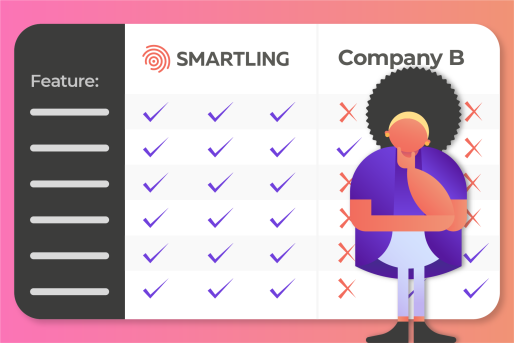Any company serious about global expansion needs a localization engineer on their team.
Localization engineers facilitate the entire localization process. Even if you’re using a translation management system (TMS) like Smartling, a localization engineer acts as a bridge between engineering, product, vendors, and translators. They make sure your code can handle multiple markets — and that it all works when it’s done.
Whether you’re putting together marketing assets like flyers or ebooks, launching an app or website, or blogging in multiple languages, your localization engineer is who makes it all possible.
What Does a Localization Engineer Do?
Localization engineers have their hands in some of the most important back-end work and software development that facilitate global expansion. That includes several different processes:
- Localization: On a coding level, the act of localization is about parsing strings and making sense of them so that they are translatable. That means dealing with placeholders, tags, and other bits of code and making sure everything that needs translation gets to the right place.
- File Processing: Similarly, any localization effort takes multiple kinds of file formats for source files. There may be Photoshop, JSON, and XML text files or other resource formats depending on your tech stack. Localization engineers pull out the pieces of these files that need to be translated and convert any coding variables into placeholders.
- Internationalization: While localization and file processing deal with the specific translation projects, internationalization is about the step before any translation — making sure your code is ready to handle multiple languages, layouts, and currencies.
- Testing: Quality assurance (QA) is an integral part of any localization process, and often localization engineers assist with the testing and final product to make sure it’s ready to ship.
Simply put, without localization engineers, the entire process couldn’t happen.
Why Do Companies Hire Localization Engineers?
Software localization engineers make sure your team has the correct processes, translation tools, and best practices in place before starting to translate the product or website into your target language.
This saves time and money down the line, eliminating tech debt and re-translation costs. Localization engineers are the connectors between product, localization, and engineering so the translation process always goes smoothly.
Companies hire localization engineers because they bring a specific set of skills to the team.
They are:
- Skilled coders. Depending on your tech stack, they have fluency in Python, C/C++, Ruby, Java, HTML, or other programming languages. They’ll need the technical skills on internationalizing multiple programming languages, file types, and understanding libraries and frameworks.
- Administrative powerhouses. They can manage translation memory, automation, and other TMS features, set up and administer new projects, and work with content management systems and other localization tools.
- Problem-solving. As any developer knows, projects don’t always go according to plan. Successful localization engineers can work analytically to understand specific needs and how to fix complex problems.
- Collaborative. Localization is a team effort. Localization engineer jobs sit at the center of program managers, translators, vendors, and other stakeholders, and they have to know how to work with everyone.
- Curious and research-driven. There isn’t always one way to code for localization, and every market has different needs. Localization engineers are detail-oriented and precise, diving deep into the code to find the answers.
- Have strong communication skills. An often-overlooked trait of great engineers is their ability to communicate with other team members on status, testing, and performance, whether that’s the localization PM, other engineers, or other product managers.
- Create standardized processes. Chances are, they’ll be familiar with standard engineering processes like agile or scrum. Even if you’re deploying with a different model, they should still be able to standardize a clear, repeatable process for your localization projects.
Often, localization engineers have advanced degrees in computer science or information technology, but it’s not always required based on the level of localization experience.
A Day in the Life of a Localization Engineer
For a localization engineer, the tasks depend on the readiness of the particular codebase or project and how many translation requests you’re working with at any given time.
Day-to-day to-dos might include status updates, QA testing, preparing code for translation, or parsing strings.
Localization engineers come in at the most important part of the software localization workflow, just before translation. Ideally, their work hums in the background of any translation workflow so you’re always ready for another translation request.
Here’s how a software localization project works with Smartling:
- Localization engineers prep the specific section of your website or application to make sure it’s ready for translation.
- A localization project manager fields a request for new translations or updates through a project management tool like JIRA. They receive and input new copy in their native language and mark the foreign languages requested for translation.
- Smartling integrates with your content management system, project management, and design systems, so any time there are updates or new content, it’s automatically parsed into strings and sent to the translators for those languages. These file directives, applied inside files or via API, give engineers the flexibility to update and change them on the fly.
- Your assigned translators complete the work, tracking their progress and communicating directly with you throughout in case there are any questions.
- When the translations are all set, it automatically goes back into your CMS, and you click Publish.
- Localization engineers then monitor testing and overall performance, administer translation memory, machine translation, and the glossary.
Localization engineers make your translation engine run by acting as a connection point between your engineering team, your product team, and the localization team. Combining the power of an organized, skilled localization engineer and a streamlined localization workflow with tools like Smartling accelerates your entire process.
Need Localization Engineering? Try Smarting’s Professional Services
Make your localization projects possible with the best in the localization industry.
Smartling Professional Services implements and manages Smartling solutions to seamlessly connect your content platforms with our Translation Cloud.
Whether onboarding with Smartling for the first time, adding a new content source, or fine-tuning your current solution for evolving needs, our team is available to provide expertise on strategy and execution.
That’s valuable time back in your pocket, so you can focus on the bigger picture. Learn more: https://www.smartling.com/professional-services/







